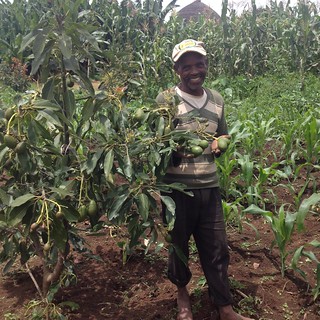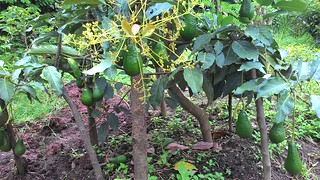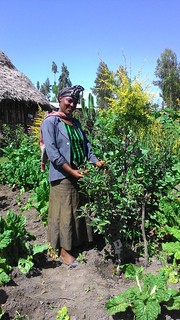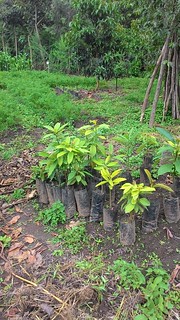Intensifying with high value trees in Africa RISING Ethiopia – some reflections from the first phase
As I write this piece on progress with the high value trees research protocol in Africa RISING Ethiopia, several circumstances, mostly the first Africa RISING project inception meeting in 2012, crosses my mind. I joined the meeting representing my organization, the World Agroforestry Center (ICRAF). I was delighted because the theme was on sustainable intensification where trees could play a central role.
While the role of trees in sustainable intensification was clear for most of the workshop participants, there were also many skeptics who made remarks such as not being sure if the tree component should be included in this project. Their main argument was that farmers will not be willing to plant trees since it takes a longer time for them to mature.
I continuously made the case for the role of trees in every single statement I made. I was determined to change the completely wrong perception but it also earned me the nick name “trees” by fellow project participants. Never mind, our early win proposal in sustainable intensification finally got through!
To be honest, the worries of the skeptics were not entirely unfounded. So in our early win study objectives, we decided to also find out why tree planting is successful in some areas but adoption is slow in others (see our Tale of Two Villages for the final story.
We also brought together experts from different disciplines to dialogue on ways to overcome and conflicts and create synergies (see a report). This was followed by detailed local knowledge assessments to identify knowledge gaps and demand driven technologies. See the reports: http://hdl.handle.net/10568/52334; http://hdl.handle.net/10568/41680, and http://hdl.handle.net/10568/33559.
From these assessments, we learned that the common prescription – one size fits all – will not work and indeed providing options to each context was the only way forward.
The team was determined to bring change in food security, nutrition, income generation and creating climate resilient farming systems in the barren parts of the Ethiopian highlands. When I say team, it was not only the ICRAF team , but also our partners from the CGIAR as well as national and private partners. I have to also say that the Africa RISING holistic concept and participatory approach through the innovation platform in bringing together all parties in one platform is exemplary.
Farmers normally tend to be suspicious of anything new but our approach was different. Our awareness creation meetings and field visits offered free selection and testing from a basket of short and long term technologies. Particularly, for high value trees, we offered field visits to volunteer model farmers from a site in Bale to another in Debre Birhan. This was to show what an apple tree looks like ; it was the first time most of them had ever seen apple fruits.
We also took farmers from a site in Lemo to another in Butajira to show them avocado varieties. In Lemo woreda, a few farmers had previously tried to plant local avocado varieties but it had failed to fruit even years later and they were especially skeptical about whether avocado would actually be successful in the area.
Of course we made sure not to promise that the new varieties would give fruits either, but we just asked them to partner with us for joint research, to test the different fruit tree varieties on their farms. We finally managed to persuade more than enough farmers about the potential multiple benefits those trees could provide. But we didn’t just leave them to it, we also provided pre and post tree planting management training at different growth stages (see our report) and we employed on farm and laboratory analysis on physiology, growth, and social aspects (see http://hdl.handle.net/10568/51572).
So where are we now?
It’s been less than two years since we started planting avocado seedlings in Lemo woreda and apples in Sinana, Debre Birhan and Maychew.Our avocado in Lemo woreda is amazingly giving fruits with differences among varieties and sites (photo 1). The apple trees have started fruit setting as well (photo 2).




Today most of the farmers do not need persuasion to plant trees but they are demanding to plant more beyond the capacity of the project. In Lemo woreda, demand has grown so high for fruit trees that the farmers are asking to contribute their own money to purchase seedlings. But due to a lack of enough seedlings they have demanded that the Africa RISING project help them establish a nursery site and provide training on propagation techniques to get access to quality seedlings in their surroundings.
It is inspiring to see that, in Lemo woreda, some innovative model farmers have even gone ahead of us and started grafting by using local Avocado trees (which have not been giving fruit) as a rootstock and scion material from the avocado varieties we provided (Photos 3 and 4 above).
However, there are still plenty to be encouraged and it takes passion, patience, effective partnerships and most of all investment to bring change at scale.
The Africa RISING project spirit and the willingness of the farmers and partners to contribute and learn from one another is truly inspirational. The enthusiasm and determination of the Site coordinators was amazing. In my view, there are still ongoing research questions and a prospect for new research questions and there is a huge demand and scope for scaling up the tested varieties through integrated appropriate scaling up strategies within and beyond the study sites. The potential is huge and the future is bright if we continue to work together to address the challenges including lack of capacity and knowledge and we are ready to support our partners in the next steps. Stay tuned for more!
Blog post by Aster Gebrekirstos, ICRAF
Photos by Hadia Seid





Latest Comments